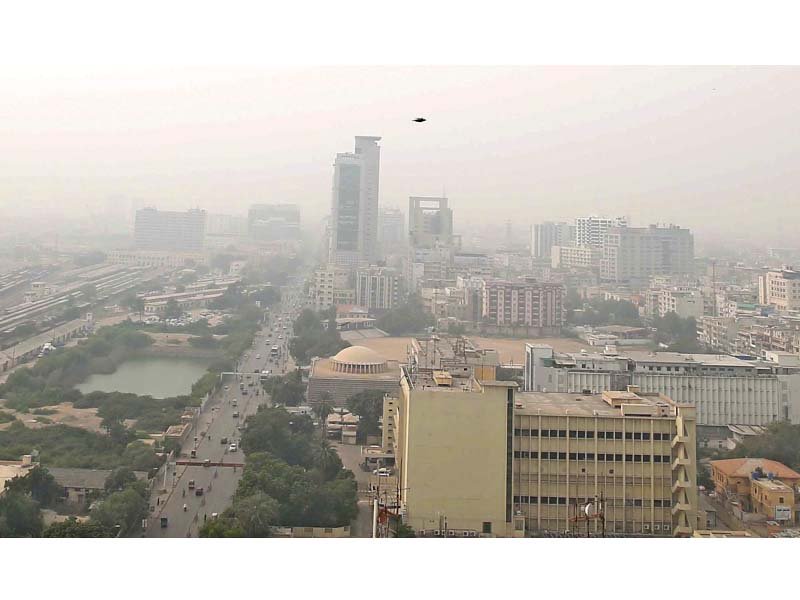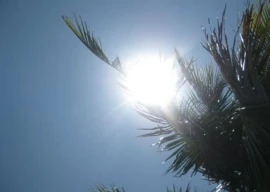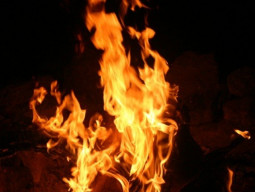
The chill that began on December 24 is expected to continue next week as a new system of rain, predicted to enter Pakistan from Iran and Afghanistan on Saturday, will make the mercury drop further in the metropolis and the rest of the province.
Looking at the weather pattern in the region, environmental and meteorological experts told The Express Tribune that weather this cold was last recorded in the late 1980s.
"It's an unusual cold," said former Pakistan Meteorological Department director-general Ghulam Rasool. "Such weather was recorded across Pakistan almost 32 years ago," he stated, adding that the freezing winds were a rarity for the residents of Karachi. "The people of the provincial capital are not used to tolerating temperature that is below 10 degrees Celsius for an extended time."
Rasool predicted that the cold wave would linger into next week. "It may last longer since it will intensify after rainfall across the country," he added.
Meanwhile, the Met Office focal person, Sardar Sarfaraz, also told The Express Tribune that the cold snap will continue for a while. "The cold wave, with gusty winds, will remain for a couple of days. We'll have similar weather even next week," he forecast, adding that it may get colder in the upcoming week.
According to the Met Office records, the minimum temperature of the season in Sindh was recorded at Moen Jo Daro, where the temperature fell to 1.5 degrees Celsius last week.
On Wednesday, the lowest temperature in the province was recorded in Dadu with 2.5 degrees Celsius, while the rest of Sindh ranged between 3 degrees Celsius to 5 degrees Celsius.
Unpredicted and unreasonable
"It was an unpredictable occurrence," commented Masood Ahmed Lohar, the national programme manager for the United Nations Development Programme Small Grants Programme. "It is unreasonable weather, and it's happening because of climate change.
He believed that such cold weather had not been experienced by the older generation here. "People have started saying it has never happened before," he mentioned, adding that it appeared to be unprecedented at least in the coastal belt and its adjacent districts, including Hyderabad.
"Weather is always unpredictable," he claimed. "That's why this has shocked everyone."
This is not the first time Karachi has been hit with unexpected weather patterns. Hundreds of people died of heatstroke and dehydration in the port city during a heat wave in 2015. Environmental experts claimed at the time that the building structures here were not suitable for the extreme heat. They added that houses in Pakistan did not account for the changing weather patterns.
"Our homes are not energy efficient," Lohar pointed out. "They are very hot in the summer and very cold in the winter."
Staying warm
With the cold snap, Karachi's residents turned out to purchase jackets, sweaters and heaters on Tuesday and Wednesday.
"I was avoiding buying warmer jackets this season, but it is incredibly cold," said Suleman Altaf, purchasing clothes from Zainab Market. "The rates are higher now as people are rushing to the markets on hearing that the cold wave will be here for longer."
Farhan Ahmed, a resident of Mehmoodabad, said his room was so unbearably cold on New Year's Eve that he could not sleep even with a blanket. "People here don't use heaters; there is no concept of keeping one for such days," he said, adding that his family and friends too were complaining that the walls of their homes were colder than last year.
Taking precautions
"Keep your children warm and wrap them up in appropriate clothes," advised Dr Iqbal A Memon, former president of Pakistan Paediatric Association. Adding that it was flu season as well, he said that people should allow some ventilation in rooms. "I strongly suggest reasonably covering children with warm clothes and keeping them away from cold food," he added.
Dr Memon further advised school administrations to keep their classrooms clean. "Flu can easily spread from one child to another," he explained, telling parents to vaccinate their children. "I cannot tell people to keep their children at home because of harsh weather, but precautionary measures can keep them healthy."

1730360426-0/Menendez-Brothers-(2)1730360426-0-165x106.webp)
1732534556-0/taylor-(14)1732534556-0-165x106.webp)
1725872216-0/Tribune-Pic-(3)1725872216-0-165x106.webp)
1732532771-0/BeFunky-collage-(89)1732532771-0-165x106.webp)












COMMENTS
Comments are moderated and generally will be posted if they are on-topic and not abusive.
For more information, please see our Comments FAQ